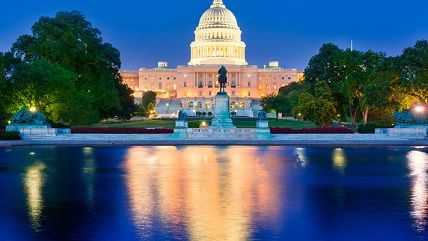Government Should Make Economic Freedom Its New Year's Resolution
Free countries are wealthier and healthier.


It's Christmas time again, and with it come the dreams of better times. Families struggling with the consequences of the most recent recession will be happy to know that there is a simple way to improve their lives and keep or make more money in the process. It's called economic freedom, and the United States used to be very good at maintaining it.
Economic freedom is measured by, among other things, levels of personal choice, the ability to enter markets and the security of privately-owned property. According to the Fraser Institute's annual Economic Freedom of the World report, the United States ranks 16th in terms of being an economically free country. It is a significant fall from its second-place status in 2000.
"A weakened rule of law, the so-called wars on terrorism and drugs, and a confused regulatory environment have helped erode economic freedom in the United States," explains Fred McMahon, one of the report's authors.
There is a vast amount of literature on the benefits of economic freedom. For instance, a review of 45 studies by economists Chris Doucouliagos and Mehmet Ali Ulubasoglu shows a strong relationship between economic freedom and growth. But it is also associated with higher income levels (i.e., more money in people's pockets) and better environment outcomes (better living conditions).
Better yet, as my colleague Matthew Mitchell documented in several places, more economic freedom also means less of the things we don't want—such as national insecurity, crimes and infant mortality—and more of the stuff we do want, such as literacy. He writes, "The balance of evidence is overwhelming that economic freedom corresponds with a wide variety of positive outcomes with almost no negative tradeoffs."
The same results can be found at the state level. For instance, an article called "More Economic Freedom, More Jobs," published in the October 2013 issue of Regulation magazine, looks at what could explain the large differences in unemployment rates among the states. Though they acknowledge that the gradations can be partially attributed to demographics, hangovers from the housing crisis, or the oil-and-gas boom, the authors wanted to attempt to measure the impact that economic freedom can have on unemployment rates. Their main finding is that there is a strong negative relationship between economic freedom and unemployment across the states, even when controlling for many other factors that affect the labor market.
Having a job—versus not having one—is obviously great and means more money in a family's pocket. But another source of financial improvement for families could come from actually getting rid of a bunch of government programs and regulations. There are so many that I can't list them all, but obviously, ending the decades-long war on drugs seems like a no-brainer. It would bring tremendous benefits to many families whose loved ones are locked up and the lives that are destroyed because big-government policy dictates what individuals can and cannot consume. Indeed, some 80 percent of drug-related arrests are for possession alone.
But smaller changes in policies would also save Americans a lot of money. At the Heritage Foundation, economist Salim Furth lists 12 free market reforms that would save the average American household $4,440 a year. At the local level, these policies include ending or limiting zoning laws—such as parking minimums and height restrictions for buildings. At the state level, ending occupational licensing laws and implementing medical tort reform, among other things, would improve economic freedom and save Americans their hard-earned cash.
Not surprisingly, the biggest savings would come from reforms at the federal level. Getting rid of the ethanol mandate, which requires refiners to use corn for gasoline, would save the average household $255 a year. Getting rid of the Obama administration's Corporate Average Fuel Economy standards would save the average household $448 a year. Lifting crude oil export restrictions would save the average household $227. And reducing the complexity and compliance costs of the corporate income tax would save the average household $230 per year.
I am sure that making or keeping more of their own money is on many Americans' Christmas lists this year. Maybe Congress should put improving economic freedom on its New Year's resolution list.
COPYRIGHT 2015 CREATORS.COM


Show Comments (4)